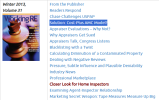J Grant
Elite Member
- Joined
- Dec 9, 2003
- Professional Status
- Certified Residential Appraiser
- State
- Florida
Cost plus elimiantes teh AMC shopping by fee. In cost plus, the lender dictates to the AMC the feel they split with the appraiser. Thus , if the lender passes through the AMC, a borrower paid an appraisal amount of $600, and the AMC says you must pay the appraiser $150 and not more nor less than $150 out of each order, it eliminates fee shopping on the part of the AMC. They are ordered by the lender to pay $450 out of the lender's collected and passed on $600. This is how internal order AMC owned by a lender typically works.As for cost-plus what that would do is *increase* the amount of shopping and negotiating the AMCs engage in (and the costs they charge the lender for doing it) . But that isn't what you had in mind, is it?
I just posted a poll. Let's see who can be honest with their responses. And who will lie in order to make a point.
As far as the poll, it was a good idea, and as we see, about 40% are willing ( or admit they are willing) to drop fees. We already knew a sizeable number of appraisers drop their fees in order to get AMC work. My point is they should not have to do it, rather than demonizing them for doing it, though of course, if they all or most of them could resist dropping their fees, they would be better paid from the AMC.

